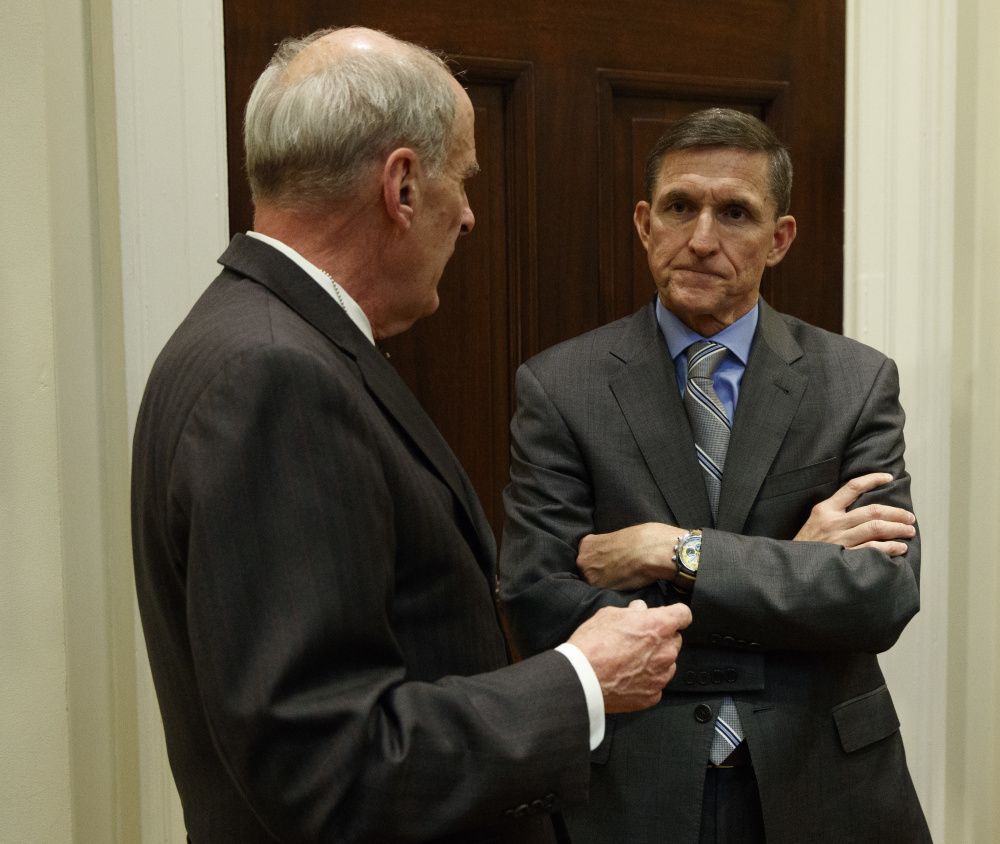Former national security adviser Michael Flynn was warned by senior members of then President-elect Trump’s transition team about the risks of his contacts with the Russian ambassador weeks before the December call that led to Flynn’s forced resignation, current and former U.S. officials said.
Flynn was told during a meeting in late November that Russian Ambassador Sergey Kislyak’s conversations were almost certainly being monitored by U.S. intelligence agencies, officials said, a caution that came a month before Flynn was recorded discussing U.S. sanctions against Russia with Kislyak, suggesting that the Trump administration would re-evaluate the issue.
Officials were so concerned that Flynn did not fully understand the motives of the Russian ambassador that the head of Trump’s national security council transition team asked Obama administration officials for a classified CIA profile of Kislyak, officials said. The document was delivered within days, officials said, but it is not clear that Flynn ever read it.
The previously undisclosed sequence reveals the extent to which even some Trump insiders were troubled by the still-forming administration’s entanglements with Russia and enthusiasm for a friendly relationship with the Kremlin.
The failed efforts to intervene with Flynn also cast harsh new light on a national security adviser, who lasted just 24 days on the job before revelations about his discussions with Kislyak – and misleading accounts of them – forced him to resign.
Providing the Kislyak bio was seen by Obama officials as part of an effort “to make sure the new team had a full appreciation of the extent of the threat from Russia,” a former U.S. official said.
The perceived need to impress that point upon Flynn added to the growing concerns among senior members of the Obama administration, who at the time were still coming to grips with the scale of Russian interference in the 2016 election and were worried that any punitive measures they imposed might be rescinded when Trump was sworn in.
The request for the Kislyak document came from Marshall Billingslea, a former senior Pentagon official in the George W. Bush administration who led Trump’s national security transition team from November until before Trump’s inauguration.
Billingslea was nominated this week for a position at Treasury overseeing efforts to disrupt terrorist financing.
A former deputy undersecretary of the Navy, Billingslea was among a small group of experienced national security hands on the Trump transition whose entrenched skepticism toward Russia seemed at odds with the pro-Moscow impulses of Flynn and the incoming president, according to the officials who spoke on the condition of anonymity.
Others included Samantha Ravich, a deputy national security adviser to Vice President Richard Cheney; and Christopher Ford, a former State Department official who now works as a special assistant on counterproliferation issues in the Trump White House.
The Trump administration has taken a harsher tone toward Russia in recent weeks after Syria, which is backed by Moscow, used chemical weapons on civilians. Secretary of State Rex Tillerson last month accused Russia of being “incompetent or complicit” in the attack, and CIA Director Mike Pompeo described Russian President Vladimir Putin as “a man for whom ‘veracity’ doesn’t translate into English.”
But Trump this week renewed his skepticism that Russia was responsible for a hacking and propaganda campaign targeting last year’s presidential race .
Asked recently by CBS whether he believed the allegations of Russian meddling, Trump said, “I’ll go along with Russia. Could’ve been China, could’ve been a lot of different groups.”
Copy the Story LinkSend questions/comments to the editors.



Success. Please wait for the page to reload. If the page does not reload within 5 seconds, please refresh the page.
Enter your email and password to access comments.
Hi, to comment on stories you must . This profile is in addition to your subscription and website login.
Already have a commenting profile? .
Invalid username/password.
Please check your email to confirm and complete your registration.
Only subscribers are eligible to post comments. Please subscribe or login first for digital access. Here’s why.
Use the form below to reset your password. When you've submitted your account email, we will send an email with a reset code.